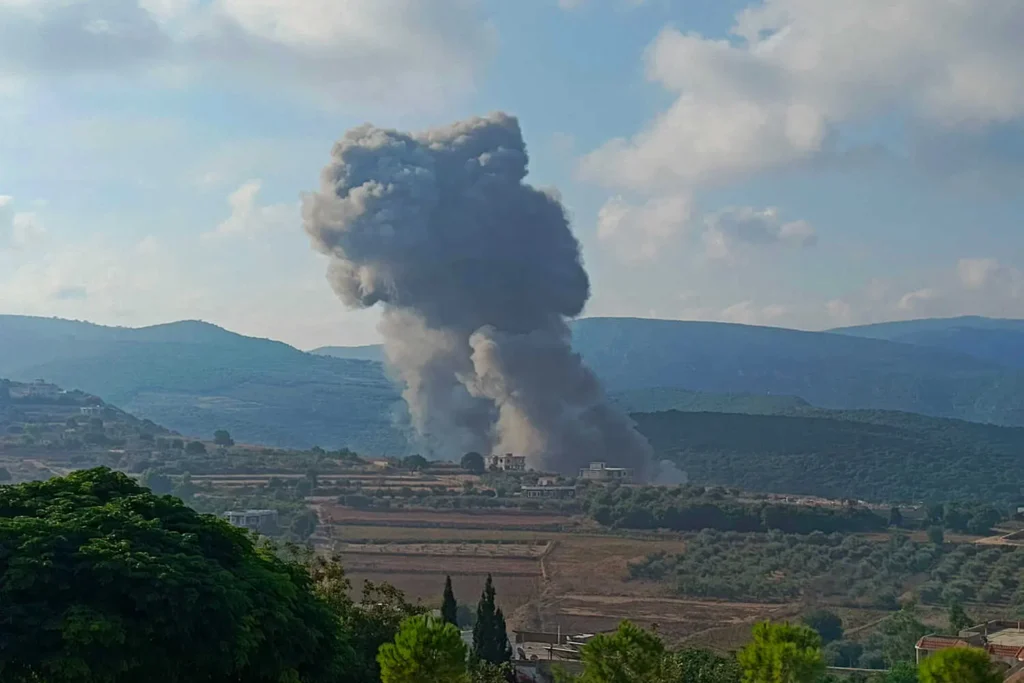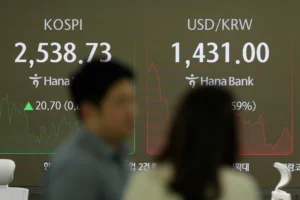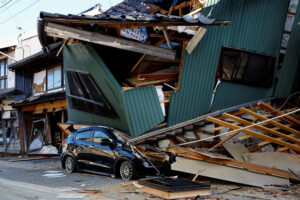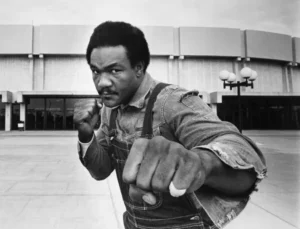Israel Conducts Airstrikes on Hezbollah Targets in Southern Lebanon Amid Rising Tensions
In a significant escalation of regional tensions, Israel launched a series of airstrikes targeting Hezbollah positions in southern Lebanon on Saturday. The Israeli Defense Forces (IDF) reported that the strikes aimed at dozens of rocket launchers and a command center belonging to the Iran-backed militant group. This military action follows the interception of rockets fired from Lebanese territory into northern Israel earlier in the day, marking the most substantial exchange of fire since the ceasefire agreement reached in November 2024.
The day’s hostilities began when residents in the northern Israeli town of Metula were awakened by air raid sirens as multiple rockets were launched from Lebanon. The IDF confirmed that three rockets were intercepted by the Iron Dome missile defense system, while three others fell short, landing within Lebanese territory. Fortunately, there were no reported casualties or significant damage in Israel. The immediate response from Israeli authorities underscored the gravity with which they viewed this breach of the ceasefire.
In retaliation, Israeli Prime Minister Benjamin Netanyahu authorized the IDF to conduct “forceful” operations against identified terror targets in Lebanon. The subsequent airstrikes targeted more than 15 rocket launchers and associated military infrastructures in southern Lebanon. According to the IDF, some of these launchers were primed for imminent attacks on Israeli soil. Notably, footage released by the military showed rockets being launched from some of the targeted sites immediately after the strikes, indicating the potential for further escalation.
Lebanese media outlets reported that the Israeli airstrikes resulted in the deaths of two individuals, including a child, and left eight others injured. The strikes caused considerable damage in the Nabatieh Governorate, a region known for Hezbollah’s strong presence. The Lebanese army later conducted search operations in the area, discovering and dismantling three primitive rocket launchers, which were presumably used in the earlier attack on Israel.
In a statement released later on Saturday, Hezbollah denied any involvement in the rocket attacks on Israel and reaffirmed its commitment to the existing ceasefire agreement. The group emphasized that it had not authorized any operations that would jeopardize the fragile truce. This denial comes amidst a complex backdrop where various militant factions operate within Lebanon, some of which may act independently of Hezbollah’s command structure.
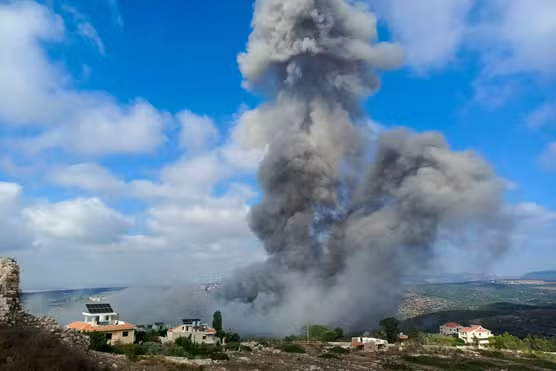
Lebanese Prime Minister Nawaf Salam condemned the Israeli airstrikes, describing them as a violation of Lebanon’s sovereignty and a potential catalyst for a broader conflict. He urged the Lebanese military to take all necessary measures to prevent the country from being dragged into a new war.
The United Nations Interim Force in Lebanon (UNIFIL), which has been monitoring the ceasefire, expressed deep concern over the escalating violence. In a statement, UNIFIL urged both Israel and Lebanon to exercise maximum restraint and uphold their commitments under the ceasefire agreement to prevent further escalation.
The current ceasefire, brokered by international mediators in November 2024, brought an end to a devastating 14-month conflict between Israel and Hezbollah. The war resulted in approximately 4,000 deaths in Lebanon, including many civilians, and displaced over 1.2 million residents. On the Israeli side, Hezbollah’s rocket attacks led to the displacement of around 60,000 residents in the northern regions and caused significant casualties.
Under the terms of the ceasefire, Hezbollah agreed to cease armed activities in southern Lebanon, while Israel committed to withdrawing its forces from the region within 60 days, handing over control to the Lebanese army and UN peacekeepers. While Israel has withdrawn from certain areas, it continues to conduct strikes on alleged Hezbollah bases, citing security concerns and the need to prevent the group from rearming.
The international community has reacted with alarm to the renewed hostilities. The United States, a key ally of Israel, called for immediate de-escalation and urged both sides to adhere strictly to the ceasefire terms. A spokesperson for the U.S. State Department stated, “We are deeply concerned about the recent violence and call on all parties to exercise restraint to prevent further loss of life.”
The European Union echoed these sentiments, emphasizing the importance of maintaining stability in the region. The EU’s foreign policy chief remarked, “The ceasefire must be preserved to ensure the safety and security of all civilians in the affected areas.”
The latest exchange of fire raises concerns about the durability of the ceasefire and the potential for a broader regional conflict. Analysts note that while Hezbollah has denied involvement in the recent rocket attacks, the presence of various militant factions in Lebanon complicates the security landscape. The possibility of rogue elements acting independently poses a significant challenge to maintaining peace.
Moreover, Israel’s ongoing airstrikes on what it describes as Hezbollah targets indicate a low tolerance for perceived threats along its northern border. This posture, while aimed at ensuring national security, risks triggering a cycle of retaliation that could spiral into full-scale conflict.
Beyond the immediate military and political ramifications, the humanitarian impact of renewed hostilities cannot be overstated. The previous conflict led to massive displacement and loss of life, with long-term consequences for the affected populations. A return to open warfare would likely exacerbate these issues, leading to further civilian casualties and displacement.
International aid organizations have expressed readiness to respond to any humanitarian crisis that may arise from renewed conflict. However, they also emphasize that prevention is preferable to response, urging all parties to commit to peaceful resolutions and dialogue.
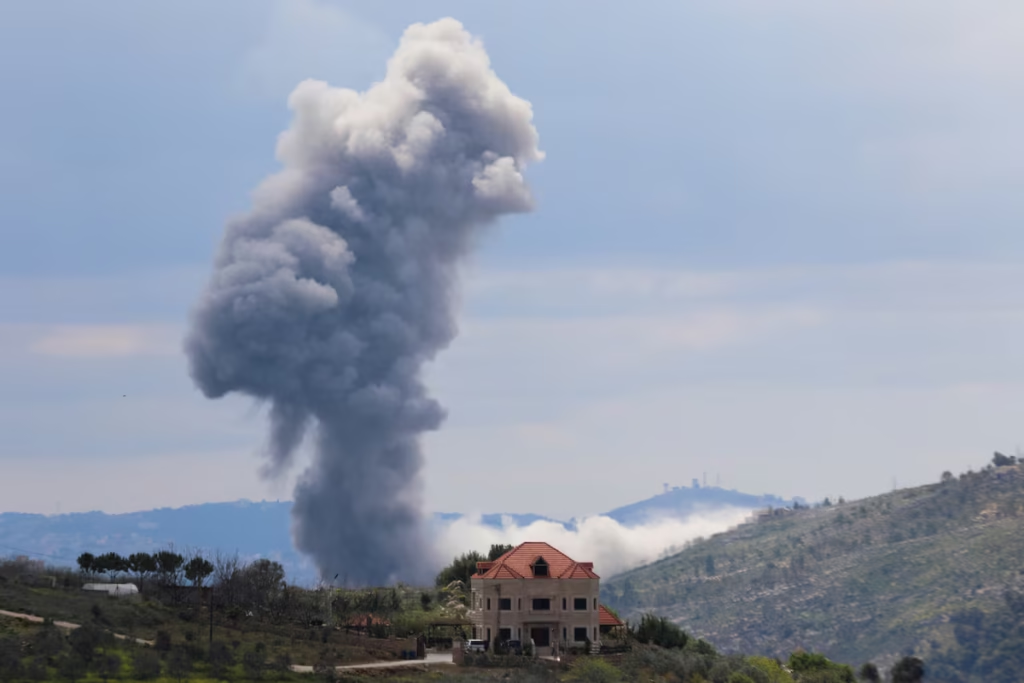
The recent escalation between Israel and Hezbollah underscores the fragility of the current ceasefire and the complex dynamics at play in the region. As both sides navigate this precarious situation, the role of international mediators and organizations in facilitating dialogue and preventing further violence becomes increasingly vital. The coming days will be crucial in determining whether the ceasefire holds or gives way to another devastating conflict.
Israel Strikes Hezbollah Targets in Southern Lebanon Following Rocket Attack.
Tensions between Israel and Hezbollah escalated once again as the Israel Defense Forces (IDF) launched airstrikes on multiple Hezbollah positions in southern Lebanon. The strikes came in response to a rocket attack on northern Israel, marking the first such assault since the fragile ceasefire agreement reached in November 2024.
Prime Minister Benjamin Netanyahu confirmed that the military had been instructed to target “dozens of terror sites,” including Hezbollah’s rocket launchers and a command center. Meanwhile, Lebanon’s health ministry reported casualties, stating that two people—including a child—were killed and eight others injured.
According to the IDF, three rockets were launched from southern Lebanon and intercepted near the Israeli town of Metula. Fortunately, no casualties or damages were reported. In response, Israel carried out airstrikes against key Hezbollah infrastructure, underscoring its ongoing security concerns along the northern border.
The Lebanese army later discovered and dismantled “three primitive rocket launchers” used in the attack. However, Hezbollah distanced itself from the incident, stating that it had not fired the rockets and reaffirming its commitment to the ceasefire agreement.
Lebanese Prime Minister Najib Mikati expressed concern over the growing hostilities, warning that Lebanon must not be dragged into another war. The United Nations Interim Force in Lebanon (UNIFIL) also called for restraint, emphasizing that an escalation of violence could destabilize the already fragile peace in the region.
Despite the ceasefire agreement, Israel has continued near-daily airstrikes on what it describes as Hezbollah targets, aiming to prevent the group from rearming. The IDF has also maintained control over five locations in southern Lebanon, which the Lebanese government considers a violation of its sovereignty. Israel, on the other hand, argues that it must keep troops stationed there due to the Lebanese army’s incomplete deployment to those areas.
The recent rocket attack is likely to increase pressure on Lebanon’s government, as Israel may use it as evidence that Lebanese forces do not have full control over their border regions.
Despite Israel’s ongoing military operations, Hezbollah has largely refrained from large-scale retaliation. The group faces significant financial challenges as it attempts to support communities affected by the war. Additionally, internal political pressure is mounting, with Lebanese President Joseph Aoun stating that only the state should have armed forces—an indirect call for Hezbollah to disarm.
Lebanon’s international partners have also conditioned financial aid on the government taking steps to curb Hezbollah’s military influence. However, given Hezbollah’s deep-rooted political and military presence, disarmament remains a complex and highly sensitive issue.
Hezbollah initiated its latest military campaign against Israel on October 7, 2023, following attacks by Hamas on Israeli territory. The group claimed that its actions were in solidarity with Palestinians in Gaza, leading to a major escalation of hostilities.
In response, Israel launched a widespread air campaign across Lebanon, assassinated key Hezbollah leaders, and carried out a ground invasion in southern Lebanon. The conflict resulted in the deaths of approximately 4,000 people in Lebanon, many of whom were civilians, and displaced over 1.2 million residents between September and November 2024.
From the beginning of its military operations, Israel has maintained that its primary goal is to ensure the safe return of approximately 60,000 displaced Israelis who fled northern communities due to Hezbollah’s rocket attacks. Additionally, Israel has expressed its determination to push Hezbollah away from border areas to prevent future threats.
Despite the ceasefire, Hezbollah remains a dominant force in southern Lebanon, and Israel continues to view the group as a significant security threat. The latest exchange of fire serves as a reminder of the region’s volatility, with both sides carefully calculating their next moves to avoid full-scale war.
The international community has expressed deep concern over the renewed clashes between Israel and Hezbollah. The United Nations, United States, and European Union have urged both parties to exercise restraint and uphold the ceasefire agreement.
The situation remains highly tense, as any further escalation could have dire consequences for both Israel and Lebanon. With the ceasefire agreement already on shaky ground, the coming days will be crucial in determining whether the region will slide back into full-scale conflict or maintain a fragile peace.

